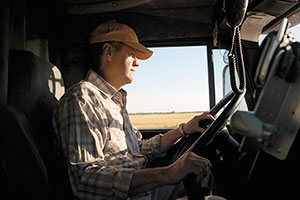Senior Reporter
Transportation Officials in Five States Testing Electronic In-Cab Credentials

Transportation officials in Wisconsin and four other states are pilot-testing a system that permits drivers to use their cellphones, tablets and laptops to electronically present their in-cab motor carrier credentials to roadside inspectors and state patrol officers.
The 2016 Motor Carrier Electronic Credential Pilot program will allow drivers in Wisconsin, Michigan, Iowa, Illinois and Minnesota to display such credentials as International Registration Plan cards, trailer vehicle certificates of registration, for-hire documents, International Fuel Tax Agreement licenses, lease agreements, certificates of insurance, hazmat registration certificates and non-hazmat bills of lading.
Documents such as commercial driver licenses, medical cards and federal regulation handbooks are not included in the pilot, according to the Wisconsin Department of Transportation, the agency heading the program.
Officials in Wisconsin have been discussing the plan for several years but officially launched the test April 1. It will be operational through September.
Officials with the Federal Motor Carrier Safety Administration and the International Fuel Tax Association are assisting with the pilot, said Jay Sween, supervisor of the Wisconsin DOT’s Motor Carrier Registration unit.
“Electronic is where the world is going, obviously,” Sween told Transport Topics. “Wisconsin is just trying to take a small step to see what works and what doesn’t.”
So far, only five states are participating in the pilot, but other states are considering joining the effort, Sween said. State DOT officials are trying to enroll state-domiciled carriers in the program but also will accept electronic credentials from out-of-state truckers passing through Wisconsin.
Sween said the main goal of the pilot is to make life easier for motor carriers.
“I’ve been in the trucking industry long enough to know that credentials can get old, and they can get lost and you can spend time searching for them,” he added.
Sween said the impetus for the pilot came from a carrier who approached state officials and asked, “Can we get rid of some of the paper in our cabs?”
Although electronic credentials will be accepted, state officials advise truckers to carry paper documents in the event of glitches during the pilot.
Sween said a final lessons learned report on the pilot will be completed by January 2017.
Robert Pitcher, vice president of state laws for American Trucking Associations, said that while the IFTA license generally is accepted electronically on nationwide, other credentials in the pilot program are not.
Universal acceptance of the electronic credentials being used in the pilot would be a plus for drivers and motor carriers.
“If they know where to call it up electronically, they don’t run the risk of losing the paper, nor does the carrier,” said Pitcher, also a member of IFTA’s electronic credentials working group. “For a large fleet, there’s quite a process involved in getting all the right paperwork out to each truck. It can get very messy for a large fleet, and it can be a nuisance for even small fleets.”

